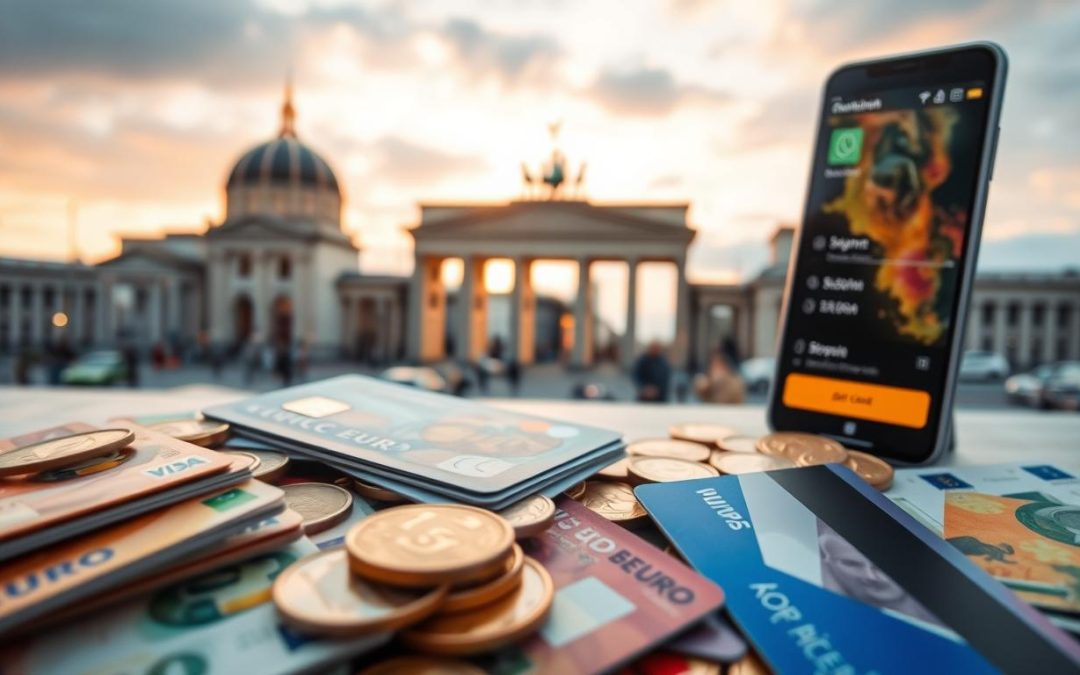Planning a trip abroad? Ever wondered how to manage your money efficiently while exploring a new country? Understanding the local currency and payment methods can make your journey smoother and stress-free.
In Germany, the official currency is the euro. Whether you’re exchanging cash or using your card, knowing the best practices can save you time and avoid unnecessary fees. This guide will walk you through everything from exchange rates to using bank services abroad.
From ATMs to mobile payments, we’ll cover the essentials to help you navigate financial transactions during your trip. Ready to make your travel experience seamless? Let’s dive in!
Key Takeaways
- Germany uses the euro as its official currency.
- Cards are widely accepted, but cash is still important for smaller purchases.
- Exchange rates at airports are often less favorable than in city centers.
- ATMs are convenient for withdrawing cash during your trip.
- Understanding foreign transaction fees can help you save money.
Understanding German Currency and the Euro
Exploring a new country means getting familiar with its money system. In Germany, the official currency is the euro, which is used across 19 European nations. Knowing how it works can make your trip smoother and more enjoyable.
Euro Denominations and Coinage
The euro comes in both coins and banknotes. Coins are available in denominations of €2, €1, 50c, 20c, 10c, 5c, 2c, and 1c. Banknotes are issued in €5, €10, €20, €50, €100, €200, and €500. However, the €500 note is no longer issued but remains valid.
Each coin and banknote features unique designs, making it easy to identify them. For example, German euro coins often include the Brandenburg Gate or the federal eagle. These symbols help travelers quickly recognize the currency.
Exchange Rate Fluctuations and Conversion Basics
Exchange rates can vary daily, affecting your travel budget. For instance, one euro equals approximately 90 Indian Rupees. Converting 100 euros into your local currency can give you a clearer idea of its value.
Understanding these fluctuations is crucial. Rates at airports are often less favorable than in city centers. Planning ahead can save you money and ensure you get the best deal.
| Euro Denomination | Type | Common Uses |
|---|---|---|
| €1, €2 | Coins | Small purchases, tips |
| €5, €10 | Banknotes | Snacks, public transport |
| €20, €50 | Banknotes | Restaurants, shopping |
| €100+ | Banknotes | Hotels, large expenses |
Being informed about the euro system and exchange rates ensures you’re prepared for any financial situation during your trip. Whether you’re handling cash or using cards, these basics will make your journey hassle-free.
How to Exchange Your Money in Germany
Managing your money abroad doesn’t have to be stressful. Knowing where and how to exchange your cash can save you time and money. In Germany, you’ll find plenty of options, but not all are created equal.
Currency Exchange Offices and Banks
Banks are often the safest and most reliable places to exchange your money. They typically offer better exchange rates and lower fees compared to currency exchange counters. Many banks in major cities also have extended hours, making it convenient to plan your visit.
On the other hand, exchange offices at airports or hotels might seem convenient, but they often charge higher fees. Always compare rates before committing to a transaction. A little research can go a long way in saving you money.
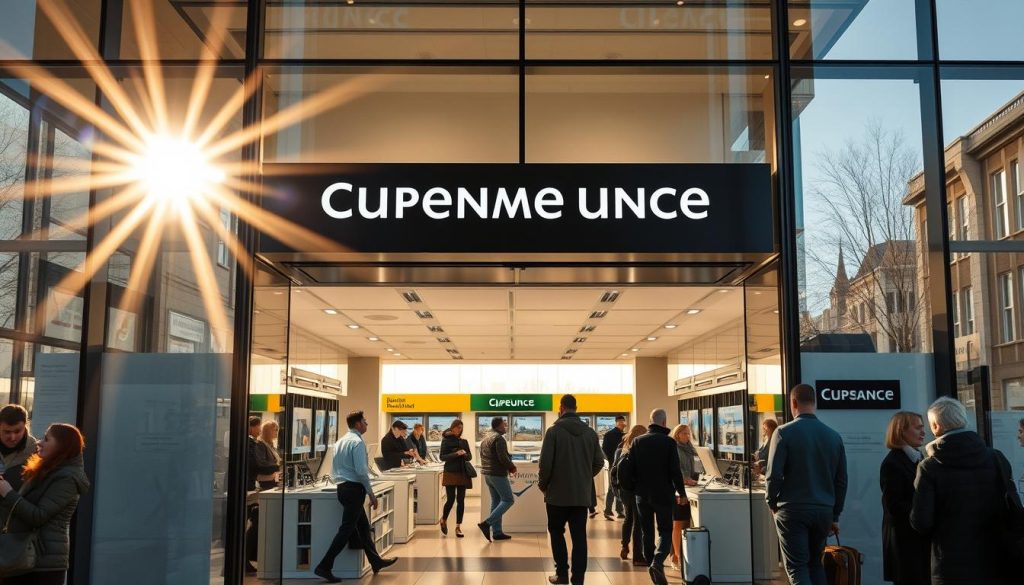
Best Practices at Airports and City Centers
If you need cash immediately upon arrival, exchanging a small amount at the airport is fine. However, avoid large transactions here. Instead, wait until you reach the city center, where you’ll find better rates at local banks or reputable currency exchange offices.
Here are a few tips to keep in mind:
- Verify the credentials of the exchange service to avoid scams.
- Check the operating hours of banks to plan your visit accordingly.
- Always ask about fees upfront to avoid hidden charges.
By following these best practices, you can ensure a smooth and cost-effective exchange experience during your trip.
Navigating ATMs and Cash Withdrawals in Germany
Accessing cash during your travels is easier than you think. In most urban areas, ATMs are widely available near banks, train stations, and airports. Using a reputable bank ATM can help you avoid unnecessary fees and ensure a smooth experience.
Finding Reliable Bank ATMs
Look for ATMs operated by major banks like Deutsche Bank, Commerzbank, or Sparkasse. These are often the safest and most cost-effective options. Many of these machines offer multiple language options, making it easier for international users.
Privately operated ATMs, such as those from Euronet or Travelex, may charge higher fees. Always check for logos like Visa, Mastercard, or Cirrus to ensure compatibility with your card.
ATM Safety and Withdrawal Limits
When using an ATM, safety should be your top priority. Choose well-lit, secure locations, especially during daylight hours. Check for skimming devices by inspecting the card slot and keypad before inserting your card.
Most ATMs have withdrawal limits ranging from €200 to €2,000 per transaction. If you need more cash, plan for multiple withdrawals. Keep in mind that some banks charge a flat fee per transaction, so larger withdrawals can save you money.
| ATM Type | Fees | Withdrawal Limit |
|---|---|---|
| Bank ATMs | €0 – €5.99 | €200 – €2,000 |
| Private ATMs | €4.60 – €7.50 | €200 – €1,000 |
Remember, cash is still essential for small payments in local shops and restaurants. By following these tips, you can manage your withdrawals efficiently and enjoy a hassle-free trip.
Using Credit and Debit Cards Abroad
Using your cards abroad can be seamless if you know the right tips. In most major cities and tourist spots, credit and debit cards are widely accepted. However, smaller establishments like local cafés or shops may prefer cash. Being prepared ensures smooth transactions wherever you go.
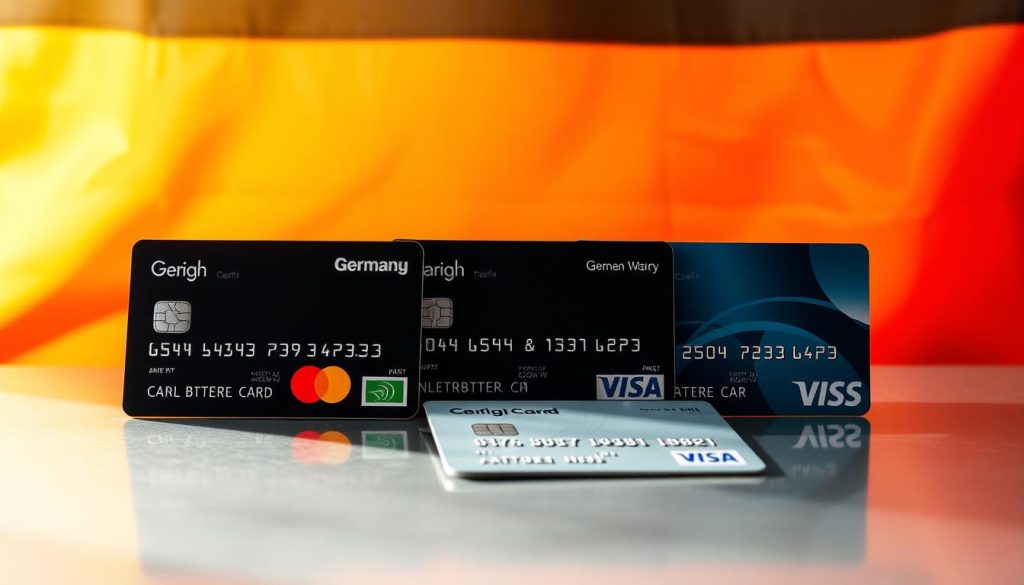
Chip and PIN Importance and Contactless Payments
Most European cards use chip and PIN technology, which is more secure than magnetic stripes. When paying, you’ll often need to enter a PIN. Contactless payments are also on the rise, allowing quick and easy transactions for smaller amounts. Always carry a backup card in case one doesn’t work.
Minimizing Foreign Transaction Fees
Foreign transaction fees can add up quickly. To avoid extra costs, notify your bank before traveling to prevent unexpected blocks. Opt to pay in euros rather than your home currency to get better rates. Regularly monitor your statements for unauthorized charges.
Here are some additional tips:
- Use ATMs from reputable banks for cash withdrawals.
- Check for logos like Visa or Mastercard to ensure compatibility.
- Keep emergency cash for places that don’t accept cards.
By following these steps, you can make the most of your credit and debit cards while traveling. It’s all about planning ahead and staying informed.
Germany: Ultimate Travelers Guide to Currencies & Payments
Navigating financial systems in a new country can feel overwhelming, but it doesn’t have to be. This guide has covered essential topics to help you manage your money efficiently during your travel. From understanding the euro to using ATMs and cards, we’ve provided insights to make your journey seamless.
So far, we’ve explored how to exchange your money, find reliable ATMs, and use credit or debit cards abroad. These tips ensure you’re prepared for any financial situation. Whether you’re visiting bustling cities or quaint towns, knowing the local payment practices is key.
This guide is designed to be your go-to resource for all financial questions. It highlights essential services like currency exchange and secure payment systems. Familiarity with these options will make your trip smoother and more enjoyable.
Keep this guide handy as you explore different aspects of German currency and payment methods. It’s here to help you every step of the way. Ready to dive deeper? Let’s continue exploring how to make the most of your financial experience in Germany.
Tips for Getting the Best Exchange Rates
Getting the best exchange rates can save you money and make your trip more enjoyable. Whether you’re converting a small amount or a larger sum, knowing where and how to exchange your money is key. Here’s how to ensure you get the most value for your cash.
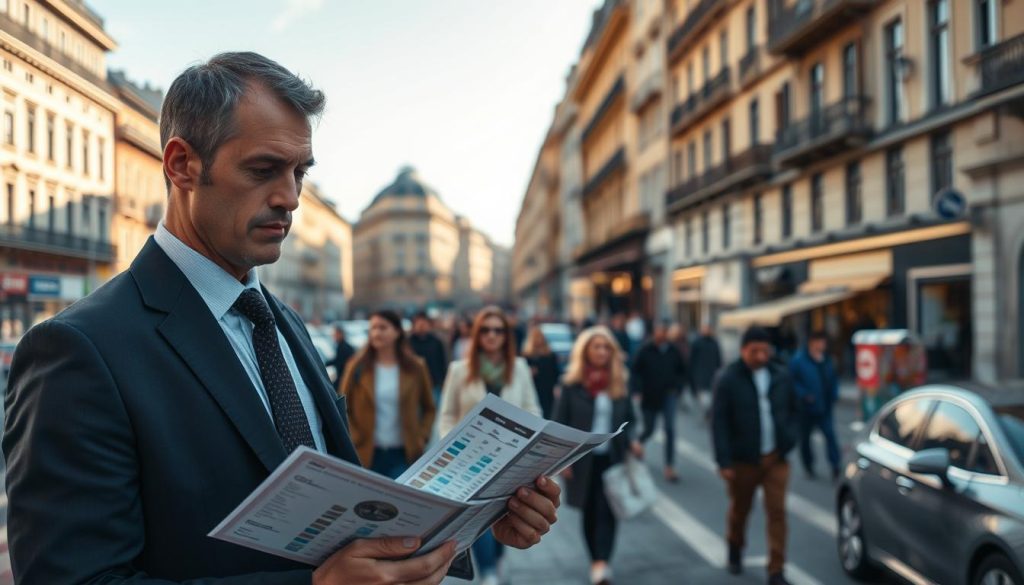
Comparing Rates and Avoiding Hidden Fees
Not all exchange services offer the same rate. To secure the best deal, compare multiple providers. Even a difference of a few cents can add up when exchanging larger amounts. Always ask about fees upfront to avoid unexpected charges.
Reputable banks and currency exchange offices often provide better rates than airport kiosks. For example, in Berlin, financial centers like Potsdamer Platz offer competitive rates. Avoid last-minute exchanges at airports, as they typically charge higher fees.
When and Where to Convert Your Money
Timing and location matter when exchanging money. City centers usually offer better rates than tourist-heavy areas. Plan your exchanges during weekdays when banks are open, and avoid weekends or holidays when rates might be less favorable.
Technology can also help. Use apps to monitor real-time exchange rates and find the best deals. Dynamic conversion options can save you money, but be cautious of additional fees.
| Exchange Option | Pros | Cons |
|---|---|---|
| Banks | Better rates, lower fees | Limited hours |
| Airport Kiosks | Convenient | Higher fees, poor rates |
| City Centers | Competitive rates | May require research |
By following these tips, you can maximize your money and enjoy a stress-free financial experience. Always stay informed and plan ahead to get the best exchange rates possible.
Emergency Currency Options for Travelers
Unexpected situations can arise during any trip, making it essential to have backup financial plans. Whether it’s a lost wallet or an unexpected expense, being prepared ensures you can handle any challenge smoothly. This section explores practical options to keep your finances secure while abroad.
Why Emergency Currency Planning Matters
Emergencies can happen at any time, and having access to money is crucial. From lost cards to unexpected fees, unforeseen circumstances can disrupt your trip. Planning ahead with backup currency options ensures you’re never left stranded.
Consider allocating a portion of your budget for emergencies. Experts recommend setting aside 10-15% of your total travel funds for unexpected costs. This small step can make a big difference in handling surprises.
Using Travel Money Cards
Travel money cards, like the Wise euro card, are a secure and convenient option. These cards can be preloaded with euros and used throughout your trip. They offer competitive exchange rates and low fees, making them a smart choice for travelers.
Here’s why they’re beneficial:
- Secure transactions with chip and PIN technology.
- Low fees for withdrawals and conversions.
- Easy to manage and reload online.
Having a travel money card ensures you always have access to funds, even if your primary card is lost or blocked.
Handling Cash Shortages
If you run low on cash, don’t panic. Contact your bank immediately to arrange a money transfer or emergency funds. Many banks offer expedited services for travelers in need.
Alternatively, use reputable money transfer services like Wise or Western Union. These platforms allow you to send and receive funds quickly, often with minimal fees. Always compare rates to ensure you’re getting the best deal.
Steps to Take in Financial Emergencies
If your primary funds become inaccessible, act quickly. Notify your bank to block unauthorized transactions and request a replacement card. Use your backup travel money card or withdraw cash from a trusted ATM.
Here’s a quick checklist:
- Keep a list of emergency contacts, including your bank’s international hotline.
- Carry a small amount of cash in a secure location.
- Research local banks and ATMs in advance.
By planning ahead and carrying backup financial options, you can travel with confidence. Whether it’s a travel money card or emergency cash, these steps ensure you’re prepared for any situation.
Currency Conversion Apps and Tools You Need
Staying on top of your finances while traveling has never been easier with the right tools. Whether you’re converting money or tracking exchange rates, technology can simplify the process. Let’s explore some of the best apps and tools to keep your finances in check.
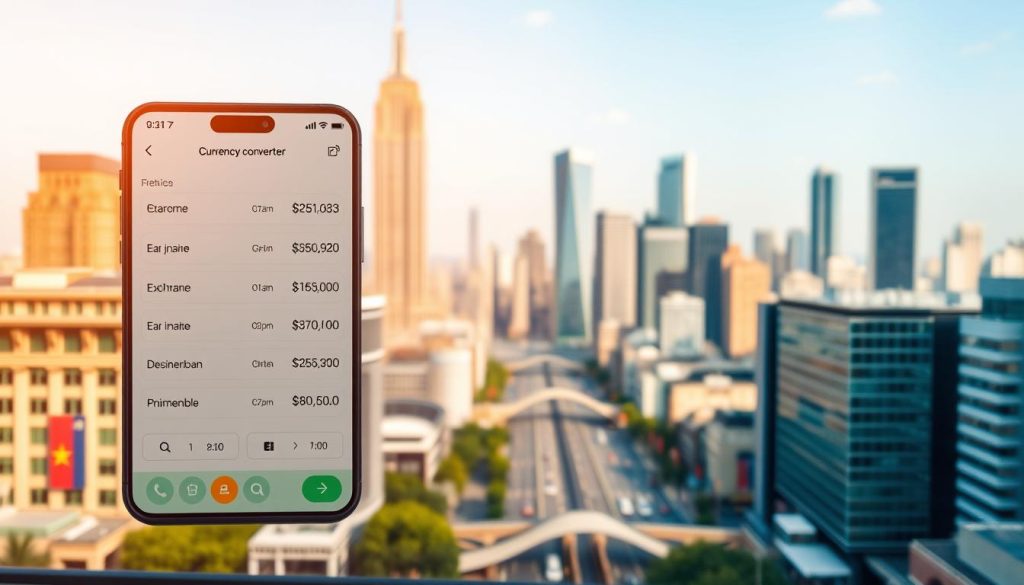
Top Currency Converter Apps
Currency converter apps are a traveler’s best friend. They provide real-time exchange rates, historical trends, and live updates. Popular options like XE Currency Converter and Currency Converter support multiple currencies and are easy to use. These tools help you make informed decisions when exchanging money.
Here’s why they’re useful:
- Access to accurate, up-to-date exchange rates.
- Historical data to track rate fluctuations.
- User-friendly interfaces for quick conversions.
Before your trip, test a few apps to find one that suits your needs. This small step can save you time and money.
How the Wise Euro Card Saves Money
The Wise euro card is a game-changer for travelers. It offers the mid-market exchange rate, which is often better than what banks or exchange offices provide. With low fees for international transactions, it’s a cost-effective way to manage your money abroad.
Here’s how it works:
- Convert and store funds in euros at competitive rates.
- Spend and withdraw money in 150+ countries without extra fees.
- Get local bank details in 9 currencies for seamless transactions.
By using the Wise card, you can avoid hidden fees and enjoy a hassle-free financial experience. It’s a smart choice for anyone looking to save money while traveling.
Cultural Etiquette and Spending Practices in Germany
Understanding local customs can make your travel experience more enjoyable and respectful. In many places, how you handle money and interact with service staff reflects your awareness of cultural norms. This section will guide you through tipping customs, cash handling, and respecting local payment practices.
Tipping Customs and Cash Handling
Tipping in restaurants and cafes is a common practice, but it’s done differently here. Instead of leaving a large percentage, locals often round up the bill. For example, if your meal costs €17.90, you might round it up to €20. This gesture is appreciated and shows good manners.
Cash is still widely used, especially in smaller establishments. When paying, use both hands to hand over money or receive change. This small act of respect can leave a positive impression. In city centers, you’ll find that many places prefer cash over cards.
Respecting Local Payment Practices
In hotels and other service-oriented places, tipping is also customary. For hotel staff, a tip of €2-3 per bag for porters or €2-4 per night for cleaning staff is standard. Taxi drivers usually receive a 5-10% tip or have the fare rounded up to the nearest euro.
While card payments are common in larger establishments, smaller shops and cafes may prefer cash. Always carry some euros for these situations. Observing these practices ensures smooth transactions and shows respect for local customs.
| Service | Tip Amount |
|---|---|
| Restaurants | Round up or 5-10% |
| Hotel Porters | €2-3 per bag |
| Taxi Drivers | 5-10% or round up |
| Cleaning Staff | €2-4 per night |
By understanding these cultural nuances, you can navigate spending practices with ease. Whether you’re dining in a restaurant or staying in a hotel, these tips ensure a respectful and hassle-free experience.
Conclusion
Handling finances during your travels can be simple with the right knowledge. This guide has covered essential tips, from understanding exchange rates to using ATMs and debit cards. Planning ahead saves you time and avoids unnecessary costs, especially at the airport.
Modern tools like currency converter apps and the Wise euro card make your trip more cost-effective. Always carry backup payment methods to handle emergencies smoothly. Whether you’re shopping or dining, being informed minimizes foreign transaction fees.
Keep this guide handy for a seamless financial experience. A well-prepared traveler enjoys every moment, from bustling cities to quiet shops. Safe travels!
The above is subject to change.
Check back often to TRAVEL.COM for the latest travel tips and deals.
Here are some Tours & Sightseeing suggestions that might pique your interests!
